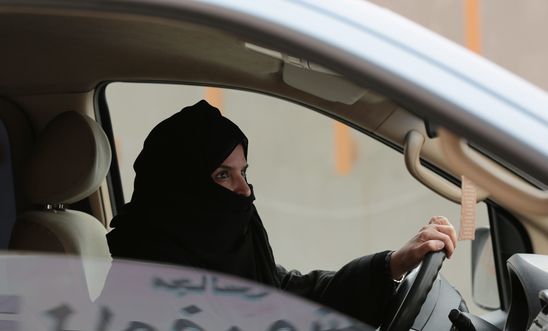
Press releases
Saudi Arabia: world leaders should call for release of detained women's rights activists

European Parliament calls for release of activists targeted ahead of lifting of women’s driving ban
‘The world must not remain silent on the repression of human rights defenders in the country’ - Samah Hadid
The international community and allies of the Saudi Arabian government must speak up to help secure the immediate and unconditional release of women’s rights defenders recently detained in Saudi Arabia, Amnesty International said today.
More than two weeks have now passed since a number of prominent women’s rights activists - including Loujain al-Hathloul, Iman al-Nafjan and Aziza al-Youssef - were arrested. They are being held incommunicado with no access to their families or lawyers.
Yesterday, the European Parliament issued a resolution calling for their unconditional release and that of all detained human rights defenders in the country. It also called for a more vocal European response.
To date, it’s believed that ten human rights activists have been detained in the crackdown. Four have been released, though the conditions of their release remain unknown. The authorities have not disclosed the whereabouts of those still held and no clear legal charges have been presented to them.
Many of the detained women’s rights defenders have previously campaigned against the long-standing ban on women drivers in Saudi Arabia. The ban is due to be lifted later this month, with licences being issued from 24 June.
Amnesty has identified six of those detained and called for their release following a clear smear campaign orchestrated by the government to discredit them as “traitors”. Those still in detention include Loujain al-Hathloul, Iman al-Nafjan, Aziza al-Yousef, Dr Ibrahim al-Modeimigh, Mohammad al-Rabea and Mohammed al-Bajadi. Two other men also reportedly remain in detention. Activists detained in the crackdown, but released last week, include Dr Aisha al-Manea, Dr Hessa al-Sheikh, Dr Madeha al-Ajroush and Walaa’ al-Shubbar.
Samah Hadid, Amnesty International’s Middle East Campaigns Director, said:
“The Saudi Arabian authorities’ endless harassment of women’s rights activists is entirely unjustifiable, and the world must not remain silent on the repression of human rights defenders in the country.
“The strong message sent by the European Parliament should be a catalyst for the EU’s Diplomatic Chief Federica Mogherini and EU member states to step up pressure on the Saudi Arabian authorities, and should also prompt others to follow suit.
“Saudi Arabia’s allies - in particular the US, UK and France - must push the Saudi Arabian authorities to end their targeted repression of human rights activists in the country.
“European and world leaders must not stay silent in the face of gross and systematic violations of the human rights of activists and human rights defenders.”
Systematic repression
Amnesty continues to document patterns of systematic repression by the Saudi Arabian authorities in which they have silenced virtually all independent human rights defenders and critics, sentencing most to lengthy prison terms and forcing some to flee the country. The country’s 2014 counter-terror law and its follow-up decrees have been used to prosecute human rights activists on vague and overly-broad charges. The Specialised Criminal Court, a court set up to deal with security and terrorism-related offences, has also sentenced several human rights activists to up to 15 years in prison in blatantly unfair trials.
Call on UK to support human rights defenders
Kate Allen, Amnesty International UK’s Director, said:
“The level of danger facing activists worldwide has reached crisis point. Every day people are threatened, tortured, imprisoned and killed for what they fight for, believe in or simply for who they are.
“The protection of human rights defenders must be put at the heart of the Foreign Secretary’s vision of ‘Global Britain’ if the UK is to be a credible voice on human rights post Brexit. Now is the time for the UK develop a coherent strategy on tackling the global surge in repression of human rights defenders.”